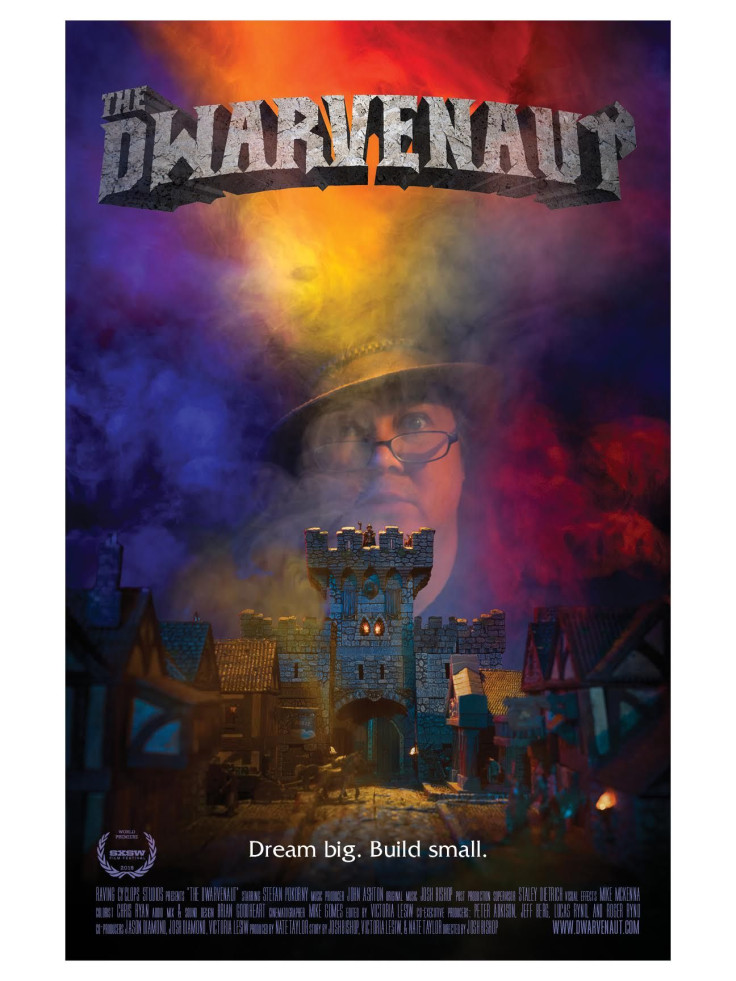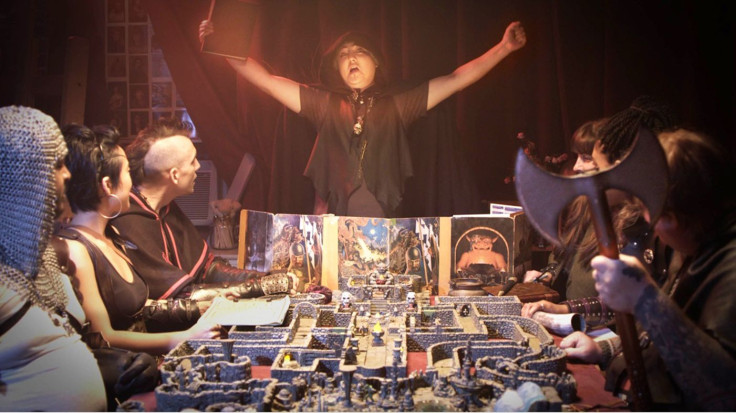The best moments of The Dwarvenaut emerge straight from the imagination of its subject, Stefan Pokorny. An oddball Brooklyn entrepreneur, Pokorny is the mastermind behind Dwarven Forge, which creates miniature terrain sets—dungeons, caverns, cities and sewers—for involved sessions of Dungeons and Dragons. Pokorny, a bundle of flamboyant positivity, will make you believe in the sheer power of these tiny, spaces, crafted from his durable “Dwarvenite.”
Pokorny is convinced Dungeons and Dragons is the humanist answer to the digital, inhuman purgatory we’ve built for ourselves, speaking in grandiloquent torrents about fantasy’s transformative power. Even if you don’t buy into his patter (which is dead earnest; our few glimpses at his actual sales pitches are cringeworthy), it’s hard not to feel electrified by his magic when the camera swoops through his sets, the caverns and alleyways duskily lit and laced with fog.
The Dwarvenaut - Festival Trailer from Nate Taylor on Vimeo.
In Stefan Pokorny, The Dwarvenaut has a subject capable of drawing us into his own fantasies. It helps that his life outside of D&D is equally fascinating. His troubled background, peculiar way of running his business and relationship with the wider gaming world (he’s drinking buddies with with the son of D&D creator, Gary Gygax) are all powerful anchors to the very personal Dwarvenaut story.
Then The Dwarvenaut director Josh Bishop got a bit too close. Fantasy documentary masterpiece Darkon succeeds by binding itself to the fantastical setting, the fictional LARPing empire becoming a Lord of the Rings of the imagination. It’s half documentary, half actual fantasy movie. The Dwarvenaut takes it structure from a Kickstarter campaign, which ends in anticlimactic TREMENDOUS SUCCESS! Good for Pokorny, less interesting for us.
The bigger problem is that The Dwarvenaut lets Pokorny take the reins as the movie progresses. While The Dwarvenaut was never going to be an exposé, there are ragged edges to Pokorny’s life that are left largely unexplored. Pokorny loves alcohol (“One shot leads to another and then the Black Sabbath comes on…”), which would be tawdry to harp on alone, but becomes more interesting when Dungeons & Dragons luminaries like Tim Kask inject themselves into Pokorny’s personal life.
There are also many indications that Pokorny may not be the best businessman or even the best boss. His employees seem to be under a tremendous amount of strain, so it would’ve been interesting to see more of their reaction to Pokorny’s essential flightiness. In keeping so tight on its main subject, The Dwarvenaut foregoes the other interesting characters in the party.

The Dwarvenaut doesn’t need to go after Pokorny, but there’s a missed opportunity in the way Pokorny is allowed to shape the discussion. The end of the movie becomes about Pokorny’s relationship to his parents. While heartfelt, it’s hard to care about someone else caring about their parents. Without a clear shape of its own The Dwarvenaut confines itself to some of its least interesting possible avenues. “In the beginning there was chaos…” The Dwarvenaut begins. As a documentary, it could’ve used a little more.
Documentary needs to frame itself on top of life, illuminating something about the subject that the subject may not even know about themselves. So while it’s easy to buy into the magic of Pokorny’s life and work, it’s hard to escape the nagging feeling that we’re missing out on other possibilities, sacrificed to Pokorny’s own, less interesting, emotional closure. Again, Darkon feels like a model for a better path, framing its characters in an epic struggle, sympathetic, but from a perspective just outside their actual self-perception of events.
The Dwarvenaut is a winning documentary, with a central character whose charms are evident and fascinating. Still, it’s hard to escape the feeling that The Dwarvenaut has allowed Stefan Pokorny to be the Dungeon Master of his own story, when an outsider should have DMed.














![[EG April 19] Best 'Stardew Valley' Mods That Will Change](https://d.player.one/en/full/226012/eg-april-19-best-stardew-valley-mods-that-will-change.png?w=380&h=275&f=955520b8313253ee3c39c791f6210f38)



